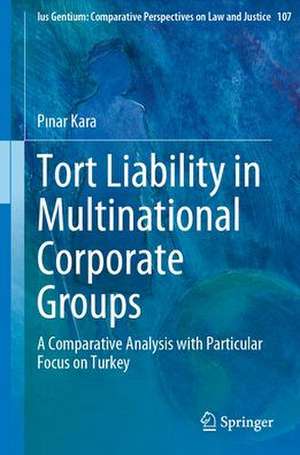Tort Liability in Multinational Corporate Groups: A Comparative Analysis with Particular Focus on Turkey: Ius Gentium: Comparative Perspectives on Law and Justice, cartea 107
Autor Pınar Karaen Limba Engleză Hardback – 19 iun 2023
Din seria Ius Gentium: Comparative Perspectives on Law and Justice
- 20%
 Preț: 1128.16 lei
Preț: 1128.16 lei - 20%
 Preț: 1565.18 lei
Preț: 1565.18 lei - 18%
 Preț: 1115.28 lei
Preț: 1115.28 lei - 18%
 Preț: 904.28 lei
Preț: 904.28 lei - 18%
 Preț: 1001.81 lei
Preț: 1001.81 lei -
 Preț: 180.18 lei
Preț: 180.18 lei - 24%
 Preț: 787.31 lei
Preț: 787.31 lei - 18%
 Preț: 1115.28 lei
Preț: 1115.28 lei - 15%
 Preț: 635.31 lei
Preț: 635.31 lei - 18%
 Preț: 1108.67 lei
Preț: 1108.67 lei - 18%
 Preț: 1007.97 lei
Preț: 1007.97 lei - 18%
 Preț: 784.79 lei
Preț: 784.79 lei - 18%
 Preț: 1223.11 lei
Preț: 1223.11 lei - 18%
 Preț: 891.02 lei
Preț: 891.02 lei - 18%
 Preț: 1009.40 lei
Preț: 1009.40 lei - 18%
 Preț: 1014.89 lei
Preț: 1014.89 lei - 18%
 Preț: 896.70 lei
Preț: 896.70 lei - 15%
 Preț: 641.85 lei
Preț: 641.85 lei - 18%
 Preț: 779.71 lei
Preț: 779.71 lei - 18%
 Preț: 1010.79 lei
Preț: 1010.79 lei - 18%
 Preț: 1010.03 lei
Preț: 1010.03 lei - 18%
 Preț: 950.52 lei
Preț: 950.52 lei - 15%
 Preț: 638.76 lei
Preț: 638.76 lei - 18%
 Preț: 947.50 lei
Preț: 947.50 lei - 20%
 Preț: 564.78 lei
Preț: 564.78 lei - 18%
 Preț: 1115.14 lei
Preț: 1115.14 lei - 18%
 Preț: 939.42 lei
Preț: 939.42 lei - 15%
 Preț: 635.80 lei
Preț: 635.80 lei - 15%
 Preț: 637.59 lei
Preț: 637.59 lei - 15%
 Preț: 643.65 lei
Preț: 643.65 lei - 24%
 Preț: 809.18 lei
Preț: 809.18 lei
Preț: 1005.74 lei
Preț vechi: 1226.52 lei
-18% Nou
Puncte Express: 1509
Preț estimativ în valută:
192.51€ • 209.18$ • 161.81£
192.51€ • 209.18$ • 161.81£
Carte tipărită la comandă
Livrare economică 21 aprilie-05 mai
Preluare comenzi: 021 569.72.76
Specificații
ISBN-13: 9783031293351
ISBN-10: 3031293355
Ilustrații: XVII, 290 p.
Dimensiuni: 155 x 235 mm
Greutate: 0.61 kg
Ediția:2023
Editura: Springer International Publishing
Colecția Springer
Seria Ius Gentium: Comparative Perspectives on Law and Justice
Locul publicării:Cham, Switzerland
ISBN-10: 3031293355
Ilustrații: XVII, 290 p.
Dimensiuni: 155 x 235 mm
Greutate: 0.61 kg
Ediția:2023
Editura: Springer International Publishing
Colecția Springer
Seria Ius Gentium: Comparative Perspectives on Law and Justice
Locul publicării:Cham, Switzerland
Cuprins
Introduction.- Introduction to FDL and the Nature of FDL Claims.- Multinational Corporate Groups, Their Position in International Law and Regulating Multinational Corporate Groups.- Comparative Analysis of Substantive Legal Grounds for FDL.- A Comparative Analysis of FDL under Private International Law.- Conclusion.
Notă biografică
Dr. Pınar Kara is a qualified lawyer with expertise in business and human rights. She obtained her Bachelor in Laws (LL.B.) from Bilkent University in Turkey (2006). She attended as a Jean Monnet scholar to Leiden University in the Netherlands, where she achieved her Master of Laws (LL.M.) degree in Advanced Studies in European Business Law (2008). She was a visiting research associate at the Centre for Commercial Law Studies (CCLS), Queen Mary University of London (2018). She achieved her Ph.D. degree in Civil Law at Istanbul Bilgi University in Turkey (2021), with a thesis on tort liability in corporate groups. She is the co-founder of Minerva Business and Human Rights Association, an independent NGO in Turkey with a central focus on business and human rights. She divides her time between Paris and Istanbul.
Textul de pe ultima copertă
Multinational corporate groups are important actors in today’s global economy, with the power to impact the masses through their activities. National legal systems, which usually have no extraterritorial authority, remain insufficient to regulate the activities of multinational corporate groups, which operate worldwide, not only in the countries where the parent companies reside (home country), but also in countries where the subsidiaries operate (host countries). The mentioned lack of an effective legislation leads to an unjust imbalance – to the benefit of multinational corporate groups and to the detriment, especially, of involuntary creditors, such as tort victims of corporate activities, which predominantly concern human rights abuses and environmental violations. Against this backdrop, the book firstly assesses the position of multinational corporate groups in international law and then discusses potential reforms to corporate law that would allow for a multi-stakeholder approach. It analyses certain aspects of Turkish tort law that could potentially accommodate liability claims against the parent companies of multinational corporate groups for damage incurred due to their transnational subsidiaries’ activities (referred to as ‘foreign direct liability’ in legal doctrine). To this end, the potential legal grounds of fault liability and strict liability are assessed under Turkish law, with a particular focus on the duty of care, in comparison with the corresponding case law in the UK and the Netherlands. Mandatory human rights due diligence is also analysed with a view to proposing a new regulation in Turkish law. Lastly, the aspects of foreign direct liability claims related to private international law are assessed in order to answer the questions of jurisdiction and applicable law within the scope of a comparative legal study.
Caracteristici
Provides a comparative analysis of applicable law and jurisdiction regarding transnational tort liability claims Presents a systematic analysis based on tort law Covers recent legislative instruments on mandatory human rights due diligence











